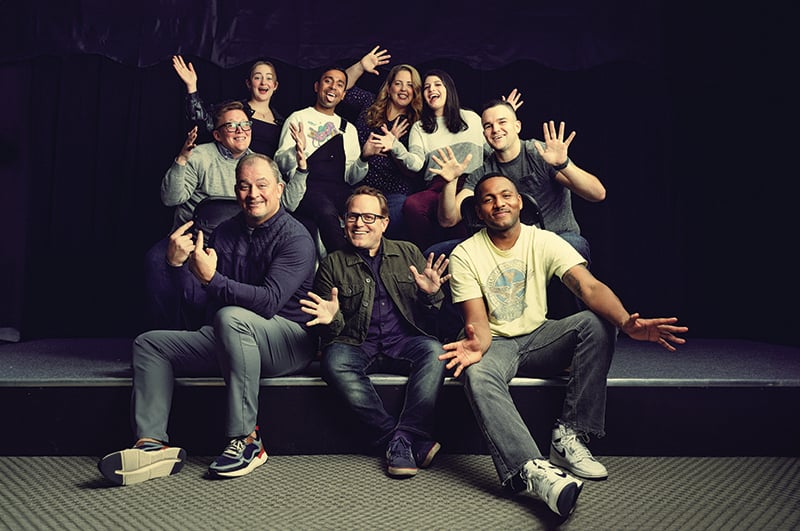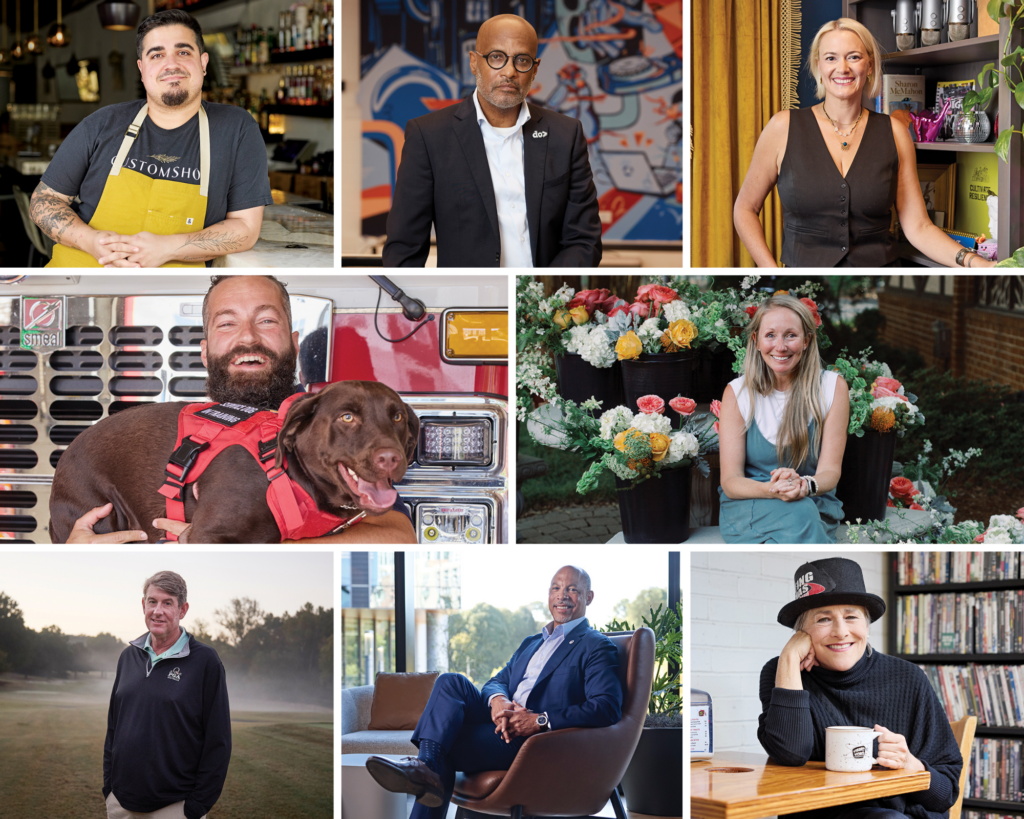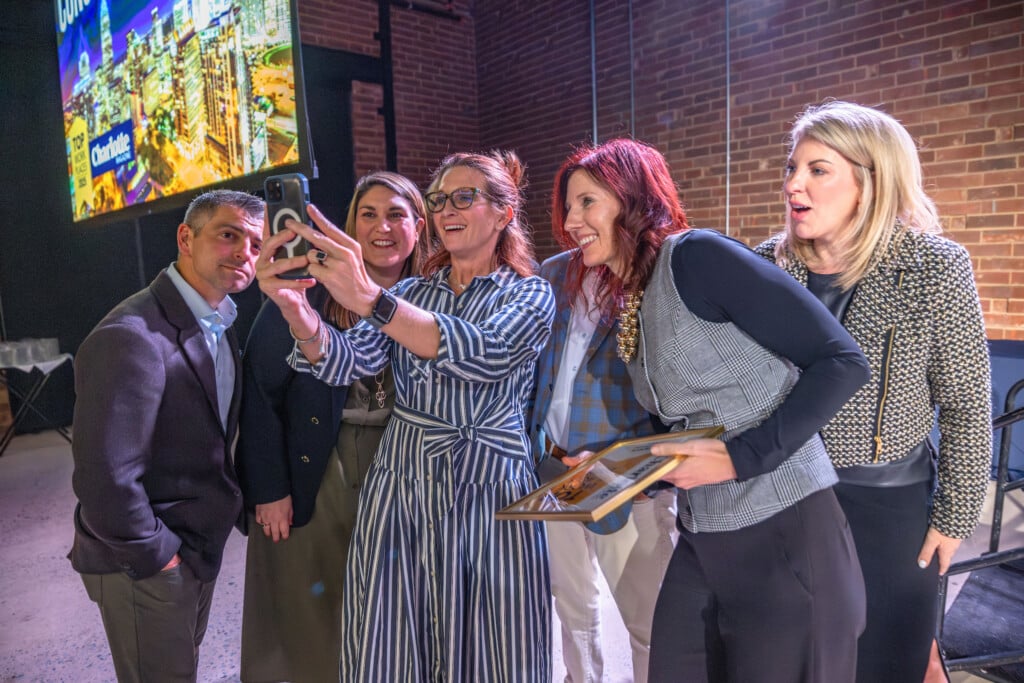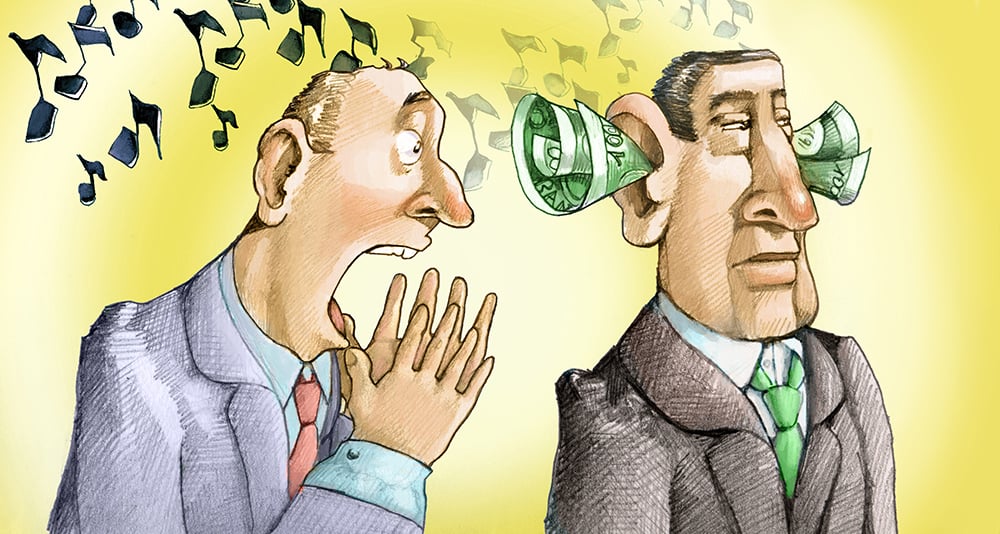A Look Inside Charlotte’s Stand-Up Comedy Scene
A colorful group of stand-ups breaks the wall of the city's high-fructose comedy scene

“You’re not going to laugh at every joke,” warns Jason Allen King.
He’s emceeing the graduation show for the stand-up comedy class he teaches at the Comedy Arts Theater of Charlotte, so his job is both to lower expectations for his eight novice students and warm up the crowd. “Any short people here?” asks King, who is 5 feet tall himself. “Jump up and down so we can see you.”
All comics have to start somewhere, and these eight stand-ups are beginning in a dimly lit room filled with folding chairs and co-workers, telling jokes about butt sweat and Elon Musk and, with surprising frequency, lactose intolerance. With varying levels of skill, they are entering a world that many don’t know exists: the rude and disreputable and sometimes hilarious place that is the city’s stand-up scene.
“I’m a good cheerleader,” King says offstage before the show. “Stand-up comedy, especially early on, is a brave thing. You’re exposing yourself: All of your flaws are showing onstage. Half the battle is getting the confidence in yourself to tackle this kind of thing.”
Some took his class to get comfortable with public speaking: One starts her set with an announcement that we are witnessing the beginning and the end of her stand-up career. A few have charming deliveries that sell weaker material. Conversely, a young woman in a leather jacket, Aine Hunt, is visibly nervous as her five-minute set begins, shifting her weight from one foot to the other, but grows more comfortable as the crowd laughs at her joke about being the ideal target for a serial killer—she’s new to Charlotte, doesn’t know her way around town, and is eager to meet strangers online.
Hunt segues into an extended comparison of her time in a sorority and her unsuitability for cult membership—“like if someone in Jonestown kept spilling the Kool-Aid, but they kept him around because his heart was in the right place.” She gets a huge laugh and allows herself a small smile.
Afterwards, most of the comedians mingle with friends and family, accepting congratulations and Mylar balloons. Hunt stays in a side room, not ready to join the crowd. She tells me how she memorized her set by listening to it through earbuds while she walked to work, repeating her jokes over and over. She was worried about the Jonestown joke—not because she thought it might breach the boundaries of good taste but because she knows not everybody her age is familiar with the 1978 mass suicide in Guyana. She’s already learned one of the first lessons of stand-up comedy: Often, the only way to learn if a joke is funny is to say it aloud.
During the pandemic, the Charlotte stand-up comedy scene was on life support. Local stand-up Blayr Nias says that during lockdown, she did a dozen comedy shows over Zoom, where she had to get used to telling jokes without the usual feedback: laughter. “You’d have to watch all the squares to see if it’s hitting,” she says. “And then if they did unmute themselves, the laughter came in delayed.”
In recent months, Charlotte comedy has jolted back to life, as if it’s been hit with defibrillator pads. At least one open mic show happens every night of the week. Venues include breweries, sandwich shops, cigar shops, even video rental stores—anywhere that would benefit from a crowd on a slow night. Blumenthal hosts the annual Queen City Comedy Experience, while the Don’t Tell Comedy organization has even put on pop-up shows in art galleries and parking garages.

Blayr Nias—shown here in 2014, when this magazine recognized her as the city’s best comedian—is still at it after 12 years in stand-up. “There’s so many new faces,” she says, “and a lot of the old ones are gone.” Photo by Logan Cyrus
For comedians, open mic nights are the easiest way to hone their professional chops or try out new material. On a good night, an open mic is funny and unpredictable; on a bad night, the audience is just a bunch of bored comics waiting their turn.
Nias started performing 12 years ago—to impress a guy she had a crush on who told her he was going to do an open mic in Fort Mill. “I put a whole set together and rehearsed it for eight straight days for hours a day,” she remembers. “I had a lot of lust-based motivation. And then I went to the open mic and just murdered.
“I was a starving artist for at least three years, but I was loving every minute. They give you a free drink and some chicken wings and 50 bucks—I was like, I’m making enough money. I’m in the big time now.” She toured the Southeast but ranged as far as Milwaukee and Boston. Often, she barely covered her expenses. “In Little Rock, I had to wait until the morning to cash my check for the gas money to make it home.” She paid her way with merchandise sales: “I had bumper stickers and T-shirts and my CD—I had so much stuff, I was like a yard sale.”
Nias recently took some time off from comedy, both because she has two young children and because the 2022 death of her mother knocked her sideways. “There’s so many new faces, and a lot of the old ones are gone,” she observes. “That’s the nature of the comedy scene. People try it. They say, ‘I’m going to quit my job, and I’m going to move into a smaller apartment.’” Now, she sees more comics who are aware of a potential career path in comedy and make a point of hosting their own open mic nights. “Back then,” she says, “it was a lovable group of scamps.”
Nias is sitting on a couch on the upper level of the Queen City Grounds coffee shop, where about 40 people have squeezed onto a narrow balcony on a Saturday night. “Nobody loves murder more than white women,” emcee Jordan Centry tells the crowd. He’s brought his own sound system but still has to compete with the noise of customers placing orders that wafts up from the lower level.
Nias is booked to do a 20-minute set to close the show. While she waits, she observes a dozen other comics from the side of the stage. She shakes her head when they flop, quietly cheers for them when they demonstrate physical presence onstage, and notes the savvy performers who know how to hit a punchline rather than ramble through a vaguely entertaining story. She doesn’t tell other comics how to do their sets, but she’s always happy to give advice if asked. “If somebody wants to talk shop, sure, buy me lunch,” she says. “You run your own race, but we’re all runners, right? So if you see somebody fall down, try to help him up.”
When she takes the stage, Nias commands the room with a story about being at a Waffle House in Rock Hill at 2 a.m., where she overheard another patron saying, “Yeah, I called the cops, but you can’t keep good dick locked up.” Nias tells the crowd, “I was the only sober person there—I was so embarrassed.”

Jason Allen King emceed the class’ graduation show, during which each of the eight graduates performed a set. “Half the battle,” King says, “is getting the confidence in yourself to tackle this kind of thing.” Above, left to right: King, Heather Caudill, Josh Ibanez, London Hedderick, Aine Hunt, Bala Narasimhan, Olivia Burnett, Darryl White, and Matt DeBoer.
What defines the Charlotte sense of humor? Is it different from the Boston sense of humor, or does it just swap in Krispy Kreme references for Dunkin’ Donuts? King says some visiting comics assume Charlotte’s in the Deep South and are surprised how cosmopolitan and open-minded audiences are. Still, it’s a banking town. “This is a very corporate, conservative city,” Nias says. “Does that affect the kind of jokes that people laugh at? Yeah. ‘Clean’ comics get a better perception. I have that ability, but it’s not my favorite—it feels like I’m dressing up in heels.”
Some open mic nights in Charlotte feel like an endless parade of young white dudes who complain about airline travel and their dating lives. Anyone who hits the microphone with an unusual point of view—whether it’s talking about being trans, an immigrant, or even a schoolteacher—has an advantage. “In my class, 50% or better are women,” King reports. “I’ve heard bookers say they want more diverse shows. That’s the best thing that can happen: different voices, different perspectives.”
One of the most distinctive voices in Charlotte comedy right now belongs to Christine McLennan. On a Monday night at the Evening Muse open mic, she careered onstage wearing one roller skate and one ice skate and performed a series of pitch-perfect vignettes about the forbidden love between a roller skater and an ice skater in a town where wheels don’t cross with blades. “I had that idea maybe a year ago,” she told me, “and I thought, Oh, that’s so stupid, it’ll never work. And then eventually I get to the point where I’m like, Well, I don’t know what else to do, so I’ll try that out.”
Another recent McLennan set: She hit the Petra’s stage in a bright-green pantsuit, leaned into her young-wonk energy with her straight hair and oversized glasses, and walked the audience through a PowerPoint presentation on “Ranking the state panhandles based on how sexually aroused they make me.” (She seemed most stimulated by the possibilities of West Virginia.) Halfway through the countdown, McLennan took an extended dance break, uninhibited by the fact that her planned music wasn’t playing.
McLennan explains, “A lot of comics will go through the world, they’ll have an experience, and then they’ll have an opinion on that, and their comedy comes from this argumentative place. That’s not particularly how my brain works. I’ll see the absurdity of something, but I don’t know how to make an argument for why it’s absurd. So I just do the thing, and then people can take from that what they will.”
McLennan lived in Charlotte in 2019 and 2020, then left for jobs in Atlanta and St. Augustine, Florida, and moved back here in early 2023. “For whatever reason, Charlotte feels more receptive and kind,” she says. “It’s a place where I actually am pretty creative, so that’s what brought me back.”
Charlotte’s been home to working comedians over the years—Rich Hall, Joe Zimmerman, Carrot Top—who eventually departed for showbiz capitals like New York City, Los Angeles, and Las Vegas. These days, there’s less need to leave town. “When social media hit, that put it all on steroids,” says Brian Heffron, who in 1996 bought a share of the city’s flagship comedy club, The Comedy Zone. “I can’t name everybody doing comedy in Charlotte.”
When Heffron started booking comics more than 30 years ago, there was one golden ticket to fame: a good set on The Tonight Show and Johnny Carson beckoning you to the couch. “As soon as they called him over, I was faxing offers,” Heffron reminisces. Now a comic with a huge Instagram following can pull crowds nationwide with no mainstream credits.
“I knew right out of college that I was super-interested in stand-up, but I’ve got stage fright,” Heffron says. “I’m from Rochester, New York, but I moved here right after college to get around a more fertile business environment. The business plan was to attack small-to-mid markets—they were underserved at the time. I didn’t want to compete in Dallas or New York City, but I felt I could bring national acts to Jacksonville.”
From his first club in Charlotte, The Comedy Zone has expanded to a network of more than 20 venues—a working comic can spend a significant chunk of the year playing Comedy Zone rooms (not to mention its festivals and corporate events). Although Heffron has turned administration of most of the clubs to a new generation of managers—“nobody wants to hear my 56-year-old BS”—he still takes pleasure in watching comics hone their voices and improve over the years. Heffron believes that, like athletes who need to play against elite competitors to elevate their game, comics need to spend time watching high-level stand-ups. “If you’re a comedian, you can always come see a show for free on me,” he says. “You’re never going to be great if you only go to the open mics.”
On a recent Friday night, The Comedy Zone (in the AvidXchange Music Factory complex) draws a healthy crowd—teachers, salespeople, Air Force personnel—to see Chris Redd, formerly of Saturday Night Live. One of the opening acts is Doc Love, born Diacos Love, who came up in the Chicago scene and spent two years on the road opening shows for the late Dick Gregory.
Love jokes about moving to Charlotte a year and a half ago, knowing nothing about the Ballantyne neighborhood he and his then-girlfriend picked from afar. “Everybody in Charlotte has been cool as fuck, even the racists,” he says onstage. “I thought there was going to be Confederate flags on the Happy Meals.”
“Charlotte is definitely coming along,” Love tells me after the show. “The scene is getting more of an identity. The comics are working harder and building more of a community. I would like to be the resident host at The Comedy Zone—I think it’d be good for both parties. Everybody’s telling me I should go to Atlanta, but I feel like Charlotte’s been pretty good. I’m going to sign a lease and get comfortable in the city.”
GAVIN EDWARDS, a contributing editor, is the author of 14 books, including the bestselling MCU: The Reign of Marvel Studios.






